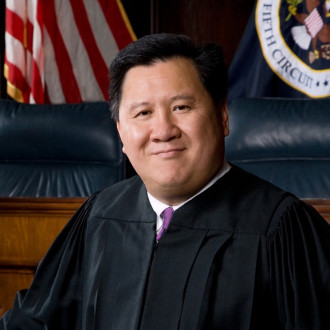Education Law
Is racism against whites ‘edgy and exciting’? Potential SCOTUS pick pens dissent supporting bullied student
The author of a Nov. 13 two-judge dissent in a case of a bullied student in Texas was Judge James C. Ho, who was joined by Judge Stuart Kyle Duncan. (Photo from the 5th U.S. Circuit Court of Appeals at New Orleans)
A Texas high school student who said he was bullied and harassed for being a white Trump supporter won’t be able to pursue his lawsuit under Title VI of the Civil Rights Act as a result of an evenly divided decision by a federal appeals court.
The split Nov. 13 decision of the 5th U.S. Circuit Court of Appeals at New Orleans had the effect of upholding a federal judge’s decision to dismiss the suit, report Bloomberg Law, Reuters and Law360. The plaintiff was a minor referred to as “B.W.”
The 5th Circuit’s decision noted the split, with nine judges on each side of the issue. Four justices explained why they thought that B.W. could not pursue his claim under Title VI, which bans discrimination on the basis of race, color or national origin by recipients of federal funds.
Nine others judges explained why they disagreed, and two of those judges declared in a separate dissent that “our culture today increasingly accepts (if not celebrates) racism against whites.”
The author of the two-judge dissent was Judge James C. Ho, who was joined by Judge Stuart Kyle Duncan. Both have been mentioned as potential U.S. Supreme Court nominees if President-elect Donald Trump gets a chance to appoint a justice during his administration.
“It’s racist to characterize whites as racist,” Ho wrote. “Because it’s racist to attach any negative trait to a group of people based on their race. And it’s no less racist just because the victimized racial group is white.”
B.W. had alleged that he was “mocked, physically beaten and verbally abused” while a middle school and high school student at the Austin Independent School District in Texas, according to the nine-judge dissent written by Judge Jennifer Walker Elrod.
One student said he was going to “beat the s- – – out of” B.W. because he was white and then did so, B.W. alleged. A teaching aide referred to B.W. as “Whitey” and belittled him for struggling with lessons, asking, “Can’t figure this one out, Whitey” A teacher allegedly mocked B.W. for listening to “white gospel music,” another expressed concern about the number of white people, and a third objected to a white man talking about gender issues. One student made a meme of B.W. dressed as a Ku Klux Klansman.
The four-judge concurrence, written by Judge Priscilla Richman, said it is “sickening and reprehensible” that a student would have to be subjected to the treatment that B.W. alleged.
But the suit makes clear that B.W. was bullied and harassed because of his political beliefs and the contrary beliefs held by classmates, the concurrence said. Any bullying based on race was not so severe and pervasive that it deprived him of educational opportunities, Richman said.
Elrod’s dissent said the suit should survive because the allegations “plausibly amount to severe, pervasive and objectively offensive racial harassment.”
Ho’s dissent noted that the Supreme Court recently granted cert in Ames v. Ohio Department of Youth Services to decide whether courts may require members of majority groups suing under Title VII of the Civil Rights Act to present special evidence of “background circumstances” to support their claims.
The plaintiff in the Supreme Court case, Mariam Ames, is a straight white woman who alleges that she was demoted from an administrator position that was then filled by a gay man, according to previous coverage by Law.com. She had unsuccessfully sought a promotion for a job later filled by a gay woman.
Federal appeals courts are split on whether majority group members must make a special showing in discrimination cases, Ho wrote in his dissent in the B.W. case.
There should be no dispute that white people are entitled to the same legal protections as any other racial group, Ho said.
Ho said law professors teach that angry white people are fearful of racial diversity, and white evangelicals are waging war on democracy. University students are told that talking to white people can “suck you dry.”
“So it’s not surprising that more institutions increasingly believe that they have cultural permission to tolerate (if not encourage) racism against whites, under the guise of promoting diversity,” Ho wrote. “Racism is now edgy and exciting—so long as it’s against whites.”
Martin Cirkiel, a lawyer for the student, told Reuters that he will ask the Supreme Court to hear the case, B.W. v. Austin Independent School District.
